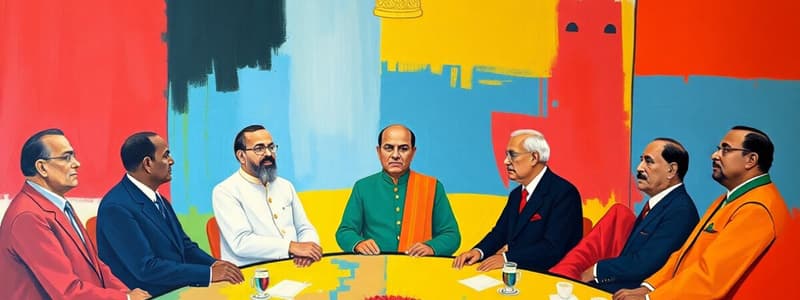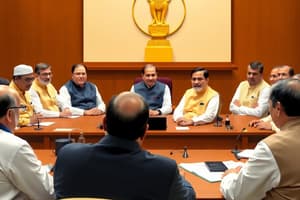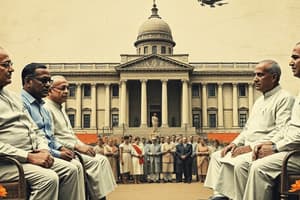Podcast
Questions and Answers
What is required for the President to exercise executive powers according to Article 74?
What is required for the President to exercise executive powers according to Article 74?
- Approval from the Supreme Court
- Personal satisfaction of the President
- Aid and advice of the council of ministers (correct)
- Majority approval from the Parliament
Who has the authority to appoint the Prime Minister?
Who has the authority to appoint the Prime Minister?
- The Council of Ministers
- The President (correct)
- The Parliament
- The Chief Justice
What must a minister who is not already a member of Parliament do within six months of their appointment?
What must a minister who is not already a member of Parliament do within six months of their appointment?
- Attend a parliamentary training program
- Become a member of either House of Parliament (correct)
- Resign from their ministerial position
- Obtain a vote of confidence
What does a minister swear to uphold in their oath of office?
What does a minister swear to uphold in their oath of office?
What type of matters is a minister prohibited from revealing under the oath of secrecy?
What type of matters is a minister prohibited from revealing under the oath of secrecy?
In the case of Devi Lal as Deputy Prime Minister, what aspect was upheld by the Supreme Court?
In the case of Devi Lal as Deputy Prime Minister, what aspect was upheld by the Supreme Court?
Which of the following statements about ministerial voting rights is accurate?
Which of the following statements about ministerial voting rights is accurate?
Which statement is true regarding the appointment of ministers by the President?
Which statement is true regarding the appointment of ministers by the President?
What is one major advantage of the 'Kitchen Cabinet' as described?
What is one major advantage of the 'Kitchen Cabinet' as described?
What is a disadvantage of the 'Kitchen Cabinet'?
What is a disadvantage of the 'Kitchen Cabinet'?
How does the 'Kitchen Cabinet' assist the Prime Minister?
How does the 'Kitchen Cabinet' assist the Prime Minister?
In which ways can the 'Kitchen Cabinet' be described in its functioning?
In which ways can the 'Kitchen Cabinet' be described in its functioning?
Which of the following statements about the 'Kitchen Cabinet' is true?
Which of the following statements about the 'Kitchen Cabinet' is true?
What does collective responsibility mean in the context of the council of ministers?
What does collective responsibility mean in the context of the council of ministers?
What happens if the Lok Sabha passes a no-confidence motion against the council of ministers?
What happens if the Lok Sabha passes a no-confidence motion against the council of ministers?
What is a key requirement for ministers concerning cabinet decisions?
What is a key requirement for ministers concerning cabinet decisions?
What is the consequence if a minister disagrees with a cabinet decision and does not wish to defend it?
What is the consequence if a minister disagrees with a cabinet decision and does not wish to defend it?
Which of the following statements regarding the salary of ministers is true?
Which of the following statements regarding the salary of ministers is true?
What is included in the benefits provided to ministers aside from salaries?
What is included in the benefits provided to ministers aside from salaries?
Which of the following allowances was NOT increased in 2001?
Which of the following allowances was NOT increased in 2001?
What must the council of ministers do if they believe the Lok Sabha does not represent the electorate's views?
What must the council of ministers do if they believe the Lok Sabha does not represent the electorate's views?
Which minister resigned in 1953 due to disagreements regarding the Hindu Code Bill?
Which minister resigned in 1953 due to disagreements regarding the Hindu Code Bill?
Which of the following is a type of minister as mentioned in the content?
Which of the following is a type of minister as mentioned in the content?
What principle does Article 75 of the Constitution relate to regarding ministers?
What principle does Article 75 of the Constitution relate to regarding ministers?
What action can the Prime Minister take if dissatisfied with a minister's performance?
What action can the Prime Minister take if dissatisfied with a minister's performance?
How is the legal responsibility of ministers different in India compared to Britain?
How is the legal responsibility of ministers different in India compared to Britain?
What distinguishes cabinet ministers from ministers of state in India?
What distinguishes cabinet ministers from ministers of state in India?
Which statement best reflects Dr. B.R. Ambedkar's view on collective responsibility?
Which statement best reflects Dr. B.R. Ambedkar's view on collective responsibility?
Which category of ministers is at the top of the hierarchy in the Indian government?
Which category of ministers is at the top of the hierarchy in the Indian government?
What is a key characteristic of the council of ministers in India?
What is a key characteristic of the council of ministers in India?
In the case of the removal of a minister, who plays a crucial role in advising the President?
In the case of the removal of a minister, who plays a crucial role in advising the President?
What does the phrase 'The king can do no wrong' imply about the legal responsibility of ministers in Britain?
What does the phrase 'The king can do no wrong' imply about the legal responsibility of ministers in Britain?
What does the term 'cabinet' refer to within the context of the council of ministers?
What does the term 'cabinet' refer to within the context of the council of ministers?
What is the primary function of ministers of state with independent charge?
What is the primary function of ministers of state with independent charge?
Which role does not have independent control over a ministry or department?
Which role does not have independent control over a ministry or department?
What is a characteristic of parliamentary secretaries?
What is a characteristic of parliamentary secretaries?
What distinguishes deputy prime ministers from other ministers?
What distinguishes deputy prime ministers from other ministers?
How does the role of the cabinet compare to the council of ministers?
How does the role of the cabinet compare to the council of ministers?
In which circumstance would a minister of state attend cabinet meetings?
In which circumstance would a minister of state attend cabinet meetings?
Which of the following characteristics differentiates the cabinet from the council of ministers?
Which of the following characteristics differentiates the cabinet from the council of ministers?
Since when have no parliamentary secretaries been appointed, except in Rajiv Gandhi's government?
Since when have no parliamentary secretaries been appointed, except in Rajiv Gandhi's government?
Which function is NOT a role of the cabinet?
Which function is NOT a role of the cabinet?
What is the relationship between deputy ministers and ministers of state?
What is the relationship between deputy ministers and ministers of state?
Flashcards
Role of the President
Role of the President
Exercises executive power with the aid and advice of the Council of Ministers.
Prime Minister Appointment
Prime Minister Appointment
Appointed by the President; advises the President on appointing other Ministers.
Minister Eligibility
Minister Eligibility
Members from either Lok Sabha or Rajya Sabha; non-MPs must become members within six months.
Oath of Office
Oath of Office
Signup and view all the flashcards
Oath of Secrecy
Oath of Secrecy
Signup and view all the flashcards
Ministerial Compensation
Ministerial Compensation
Signup and view all the flashcards
Collective Responsibility
Collective Responsibility
Signup and view all the flashcards
Individual Responsibility
Individual Responsibility
Signup and view all the flashcards
Council Composition
Council Composition
Signup and view all the flashcards
Cabinet Ministers
Cabinet Ministers
Signup and view all the flashcards
Ministers of State
Ministers of State
Signup and view all the flashcards
Deputy Ministers
Deputy Ministers
Signup and view all the flashcards
Cabinet Role
Cabinet Role
Signup and view all the flashcards
Kitchen Cabinet
Kitchen Cabinet
Signup and view all the flashcards
Study Notes
The Role of the Council of Ministers
- The President exercises executive power with the aid and advice of the Council of Ministers
- The President's satisfaction is considered to be the satisfaction of the Council of Ministers
- The Prime Minister is appointed by the President
- Other Ministers are appointed by the President on the advice of the Prime Minister
- Members of Parliament from the Lok Sabha or Rajya Sabha are typically appointed as Ministers
- Non-MPs can also be appointed as Ministers, but they must become members of Parliament within six months
- A Minister who is a member of one House of Parliament has the right to speak and participate in the proceedings of the other House, but can only vote in the House they're a member of
Oath and Salary of Ministers
- Before assuming office, Ministers are sworn in by the President
- Ministers take oaths of office and secrecy
- The oath of office includes a pledge to uphold the Constitution, sovereignty, and integrity of India
- The oath of secrecy commits Ministers to confidentiality regarding information brought under their consideration or becoming known to them
- The Supreme Court has ruled that describing a person as Deputy Prime Minister is only descriptive and doesn't confer any additional powers
- The salaries and allowances of Ministers are determined by Parliament, and they receive the same salary and allowances as members of Parliament
- Ministers also receive additional allowances including a sumptuary allowance based on their rank
Responsibility of Ministers
- The principle of collective responsibility governs the parliamentary system of government
- The Council of Ministers is collectively responsible to the Lok Sabha
- If the Lok Sabha passes a no-confidence motion against the Council of Ministers, all Ministers must resign
- The Council of Ministers can advise the President to dissolve the Lok Sabha and call for fresh elections
- Cabinet decisions are binding on all Ministers, even if they disagreed during the meeting
- Ministers are expected to defend cabinet decisions, both inside and outside Parliament
- Ministers who disagree with a cabinet decision must resign
- Article 75 also enshrines the principle of individual responsibility, allowing the President to remove a Minister during the pleasure of the President, upon the advice of the Prime Minister
- Dr. B.R. Ambedkar emphasized the importance of the Prime Minister's role in enforcing collective responsibility
Composition of the Council of Ministers
- The Council of Ministers is composed of three categories of ministers: Cabinet Ministers, Ministers of State, and Deputy Ministers
- Cabinet Ministers head important ministries and are members of the Cabinet, actively involved in policy decisions
- Ministers of State can have independent charge of ministries/departments or be attached to Cabinet Ministers
- Deputy Ministers are attached to Cabinet Ministers or Ministers of State and have no independent charge, providing administrative and parliamentary support
- Parliamentary Secretaries, a fourth category, assist senior Ministers with parliamentary duties but don't have control over any department, and have not been appointed since 1967 (with the exception of the first Rajiv Gandhi government)
- Deputy Prime Ministers may be appointed for political reasons
Council of Ministers vs. Cabinet
- The terms "Council of Ministers" and "Cabinet" are often used interchangeably, but there are distinctions in composition, functions, and role
- The Cabinet is the highest decision-making authority in the politico-administrative system
- The Cabinet plays a crucial role in policy formulation and serves as the supreme executive authority of the government
- The Cabinet acts as the chief coordinator of the Central administration
Kitchen Cabinet
- The Cabinet is the formal highest decision-making body, but a smaller "Inner Cabinet" or "Kitchen Cabinet" has emerged as a center of power
- The Kitchen Cabinet consists of the Prime Minister and a small circle of trusted colleagues who provide advice and assistance
- This informal body may include individuals outside of the Cabinet
- The Kitchen Cabinet, though efficient, can reduce the authority of the Cabinet and allow outsiders to influence government functioning
- This phenomenon of informal groups is not unique to India, and is also prevalent in countries like the USA and Britain.
Studying That Suits You
Use AI to generate personalized quizzes and flashcards to suit your learning preferences.




